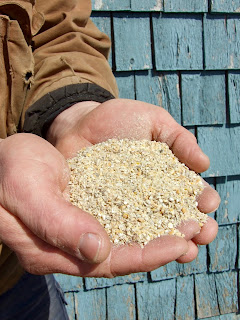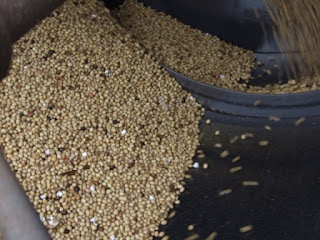I've been putting off writing this. For all kinds of reasons, but mostly because I just don't want to acknowledge what's in it.
We have to raise our feed prices.
Womp womp.
Sometimes we get teased that we're the vertically integrated Irving-esque organic farmers of the region. We grow much of our own seed for our own grain, for our own feed for our livestock that we process and market ourselves. We didn't start out that way, but I will admit the comfort I take in some of our food security here, to a degree.
And I think as a result of that vertical integration I thought we might be immune to all the wacky fluctuations happening *gestures wildly about*. I think I foolishly thought that because we knew our cost of production and our margins, we could to control the pricing and honour that crucial part of our values statement that says,
"Barnyard Organics is a diversified, family-friendly, soil-focused farm with a priority on organic integrity from seed to feed and keeping products fair and accessible to the regional community."
I knew better. I know enough about our upside down global food system to know that no one is separate from the policies and politics that affect our food. Including us.
As East Coast Organic Grainery grew, we have had to purchase more and more grains from other farmers. And we're thrilled to do so. It says right on our bag how much supporting organic farmers matters because more consistent demand means more acres turning over to organic production. Which means fewer pesticides & chemical fertilizers and more emphasis on soil biodiversity and agroecology. But those same organic farmers have choices of where to send their product and we can't blame them for choosing the highest bidder. If a broker in Ontario will pay $1500 per tonne for raw organic beans, we can't expect them to take last year's price from us, just so we can keep our feed prices the same.
We saw organic field pea prices rise last year and a general shortage meant we had to source from outside the Maritimes for the first time which meant a subsequent rise in the price for peas. It was our first sign of things to come.
Overall, this current price hike is due mostly to the significant increase in the price for soybeans, one of our main staple ingredients. But all the grains have gone up. Which means all of the feeds have gone up. Even the SoyFree options.
We know that choosing our feed is already a decision made based on values. Not the lowest value, but the highest valueS. Like wanting to support a local mill, Maritime farmers, soil health, non GMO, simple ingredients, organic grains, etc. And because we share all the same values, we absorbed the higher costs for a while, hoping this blip would pass and we could get back to ensuring our feed was accessible to all those who wanted it. But now, even after trimming our margins and having a hard look at all the excel sheets and data, we can't absorb it anymore. Prices are going up.
And it isn't easy. There are undoubtedly cheaper options out there. Some of you may be forced to switch based on dollar alone. We understand and hope that you will be back. We will still continue to insist on the best grains, simple recipes, high quality minerals and really great feed.
We're all swimming upstream against this strange and sudden tide of inflation that no one can make sense of and no one seems to be able to avoid or control.
This is an outtake from an OLD Christmas card of ours, but it feels appropriate for the moment. Things are a little fuzzy, a bit confused, not quite aligned and we sometimes put on an overdone smile, but we still hold out hope. For it all.














